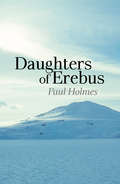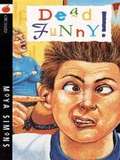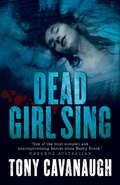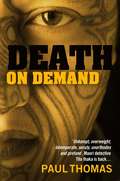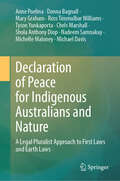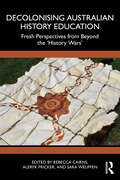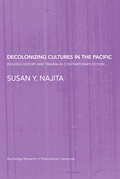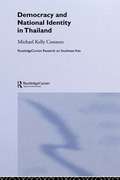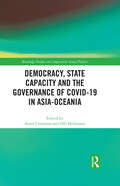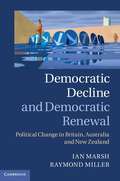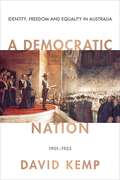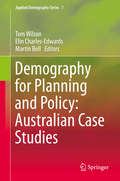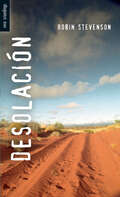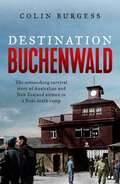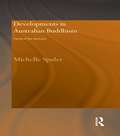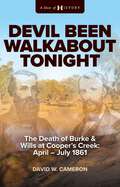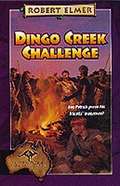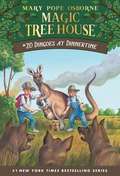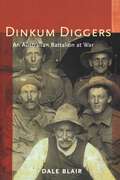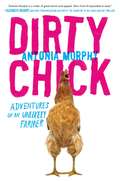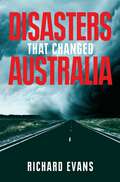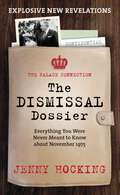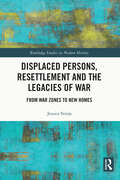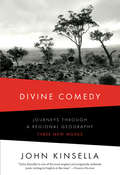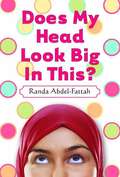- Table View
- List View
Daughters of Erebus
by Paul HolmesHow 287 people died in the air crash on Mt Erebus. What caused the crash and who covered it up
Dead Funny! (Danny Thompson #4)
by Moya Simons"You're bright red on your front and your back is dead white. Your face looks like you've been caught in a brushfire and your lips have blisters on them. Other than that you're fine." This is not Dead Funny. This is not even slightly funny. Danny won't impress Mandy Miller looking like a flame grilled steak! But it is Dead Funny when baby Bub-Tub eats snobby Mrs Fedderpot's precious diamond ring. Or when Helen the Horrible's lips swell up like rubber rings before her big date. Or when Danny's family try to survive for all of 48 hours without TV! Danny Thompson gets lots to laugh about and a bit to cry about in this hilarious collection of stories about the trials and tribulations of a normal 12-year-old boy. All of the four books in the Danny Thompson series are in the Bookshare library and they're all some of the funniest books you'll ever read. Danny wants to get along in sixth grade as long as he doesn't have to work too hard. He wants to get along with his dribbling, leaky, baby sister as long as he doesn't have to smell her. He wants to get along with his friends, even some girls, as long as he doesn't embarrass himself. As hard as he tries to steer clear of trouble, Danny gets stuck in embarrassing messes every time he turns around. Don't miss the laughs in the Danny Thompson books including #1. Dead Meat, #2. Dead Average and #3. Dead worried.
Dead Girl Sing
by Tony Cavanaugh'One of the most complex and uncompromising heroes since Harry Bosch' - Weekend AustralianWorld-class crime writing from a brilliant Australian author.Darian Richards knew he should have let the phone keep ringing. But more than two decades as a cop leaves you with a certain outlook on life. No matter how much he tried to walk away, something, or someone, kept bringing him back to his gun.One phone call. Two dead girls in a shallow water grave. And a missing cop to deal with. Something bad is happening on the Gold Coast glitter strip. Amongst the thousands of schoolies and the usual suspects, someone is preying on beautiful young women. No one has noticed. No one knows why.Darian looked into the eyes of those two dead girls. The last person to do that was their killer. He can't walk away. He will find out why.Tony Cavanaugh is an Australian writer and producer of film and television with over thirty years' experience in the industry. Dead Girl Sing is his second book featuring former cop Darian Richards and follows on from the acclaimed crime thriller Promise.The Darian Richards SeriesPromiseDead Girl SingThe Soft Touch (Short Story)The Train RiderKingdom of the Strong
Death on Demand
by Paul ThomasMaori cop Tito Ihaka, "unkempt, overweight, intemperate, unruly, unorthodox and profane ", is a stubborn investigator with an uncanny instinct for the truth. He hunts a shadowy hit-man who could have several notches on his belt, including that of an undercover cop. To complicate matters Ihaka becomes involved with a female suspect who could hold the key to everything.
Declaration of Peace for Indigenous Australians and Nature: A Legal Pluralist Approach to First Laws and Earth Laws
by Michael Davis Mary Graham Michelle Maloney Tyson Yunkaporta Anne Poelina Donna Bagnall Ross Timmulbar Williams Chels Marshall Shola Anthony Diop Nadeem SamnakayThis groundbreaking book delves into the lived experiences and collective wisdom of Indigenous communities impacted by colonialism. Through collaborations with non-Indigenous colleagues, this book seeks to inform current legal practices and advocate for a transformative shift toward justice, equity, and the recognition of First Law and Earth-centered law.By presenting Indigenous stories as case studies and incorporating the collective wisdom gained through extensive discussions and exchanges with non-Indigenous colleagues, the authors highlight the ways in which Australian law falls short in upholding holistic principles and fails to align with First Law and Earth-centered law. The book invites readers to consider alternative legal futures that are rooted in respect, justice, and the well-being of both Indigenous peoples and the natural environment. Through its thought-provoking analysis, literature reviews, and insights from Indigenous leaders, this book servesas a powerful resource for legal practitioners, policymakers, scholars, and anyone passionate about social justice and environmental sustainability. The book aims to ignite meaningful dialogue and inspire concrete actions to address the historical injustices faced by Indigenous peoples while fostering a more inclusive and equitable legal framework for the generations to come.
Decolonising Australian History Education: Fresh Perspectives from Beyond the ‘History Wars’
by Rebecca Cairns Sara Weuffen Aleryk FrickerThis book is the first of its kind to showcase a range of fresh and expert perspectives on decolonising history education in Australia. The research-informed chapters by First Nations and non-Indigenous educators and scholars provide guidance on applying practical strategies for decolonising learning and teaching, and moving beyond the ‘history wars’.History has long been the most contentious area of education in Australia. This book tackles the narrow and overtly politicised ‘history wars’ debates and foregrounds the need to re-examine impacts of settler-colonialism on Australia’s history. First-hand knowledge and much-needed teaching practices are presented, demonstrating how decolonisation can be put into action through Australian history education. The chapters present a range of perspectives from the early years right through to higher education settings and argues that there is an increased need for greater awareness, appreciation, and willingness to explore and engage with multiple narratives of truth-telling that are so often contested. Readers are guided to discover how this translates to classroom practice through unique, provocative, and research-informed strategies that foreground applied decolonising approaches.Combining theoretical perspectives and practical ideas, this book is an essential resource to support pre- and in-service teachers, in all education contexts, in navigating the decolonisation of Australian history education. This makes it an important contribution to local, as well as global, decolonising efforts.
Decolonizing Cultures in the Pacific: Reading History and Trauma in Contemporary Fiction (Routledge Research in Postcolonial Literatures #Vol. 14)
by Susan Y. NajitaIn Decolonizing Cultures in the Pacific, Susan Y. Najita proposes that the traumatic history of contact and colonization has become a crucial means by which indigenous peoples of Oceania are reclaiming their cultures, languages, ways of knowing, and political independence. In particular, she examines how contemporary writers from Hawai‘i, Samoa, and Aotearoa/New Zealand remember, re-tell, and deploy this violent history in their work. As Pacific peoples negotiate their paths towards sovereignty and chart their postcolonial futures, these writers play an invaluable role in invoking and commenting upon the various uses of the histories of colonial resistance, allowing themselves and their readers to imagine new futures by exorcising the past. Decolonizing Cultures in the Pacific is a valuable addition to the fields of Pacific and Postcolonial Studies and also contributes to struggles for cultural decolonization in Oceania: contemporary writers’ critical engagement with colonialism and indigenous culture, Najita argues, provides a powerful tool for navigating a decolonized future.
Democracy and National Identity in Thailand (Rethinking Southeast Asia #Vol. 7)
by Michael Kelly ConnorsThis book seeks to illuminate how Thai elites have used democracy as an instrument for order and discipline. Drawing on interviews, numerous Thai language sources, and critical theory, the author reveals a remarkable adaptation of the idea of democracy in the Thai context. Connors shows how elites have drawn on Western political theory to design projects to create modern citizens. He argues that it is possible to see the idea and practice of elite liberal democracy in Thailand, and elsewhere, as a key ideological resource in the project of securing hegemony over undisciplined populations. In this perspective the ideas of civil society, civic virtue, social capital and democracy itself are all part of the weaponry deployed in an effort to create 'good citizens', who act as guardians of the elite defined common good.
Democracy, State Capacity and the Governance of COVID-19 in Asia-Oceania (Routledge Studies on Comparative Asian Politics)
by Aurel Croissant Olli HellmannThis book examines the public health responses to the COVID-19 pandemic in the Asia-Oceania region and their implications for democratic backsliding in the period January 2020 to mid-2021. The contributions discuss three key questions: How did political institutions in Asia-Oceania create incentives for effective public health responses to the COVID-19 outbreak? How did state capacities enhance governments’ ability to implement public health responses? How have governance responses affected the democratic quality of political institutions and processes? Together, the analyses reveal the extent to which institutions prompted an effective public health response and highlights that a high-capacity state was not a necessary condition for containing the spread of COVID-19 during the early phase of the pandemic. By combining quantitative and qualitative analyses, the volume also shows that the effect of the COVID-19 pandemic on the quality of democratic institutions has been uneven across Asia-Oceania. Guided by a comprehensive theoretical framework, this will be an invaluable resource for scholars and students of political science, policy studies, public health and Asian studies.
Democratic Decline and Democratic Renewal
by Ian Marsh Raymond MillerThe story of liberal democracy over the last half century has been a triumphant one in many ways, with the number of democracies increasing from a minority of states to a significant majority. Yet substantial problems afflict democratic states, and while the number of democratic countries has expanded, democratic practice has contracted. This book introduces a novel framework for evaluating the rise and decline of democratic governance. Examining three mature democratic countries – Britain, Australia and New Zealand – the authors discuss patterns of governance from the emergence of mass democracy at the outset of the twentieth century through to its present condition. The shared political cultures and institutional arrangements of the three countries allow the authors to investigate comparatively the dynamics of political evolution and the possibilities for systemic developments and institutional change.
Democratic Nation: Identity, Freedom and Equality in Australia 1901–1925
by David KempA Democratic Nation: Identity, Freedom and Equality in Australia 1901-1925 tells the story of the political battle after Federation to achieve unprecedented levels of social and economic equality, while preserving both national independence and individual freedom. As the third book in a landmark five-volume Australian Liberalism series, A Democratic Nation shows how Australians, inspired by the exceptional democracy they had achieved, set out to perfect its principles while protecting it from a world they saw as increasingly threatening. The period saw political battles within and between Liberal and Labor parties as attempts to protect identities defined by nation, class and race confronted ideas of individual freedom and equality. As the war of 1914-18 between the European empires gave rise to unimaginable horrors, economic chaos and continuing violence, the Australian Labor Party shattered and the Liberal Party became submerged in a new Nationalist win-the-war alliance. In peacetime it struggled to restore the nation's social and economic health under the weight of pre-war and wartime identity-based policies. Throughout years of divisive political conflict, the Australian people would remain largely faithful to their hope of a land that would give them freedom to chart their own destinies, and would resist the siren calls of those who promised a conflict-free world by the use of centralised power to reconstruct the industrial and social order.
Demography for Planning and Policy: Australian Case Studies
by Tom Wilson Elin Charles-Edwards Martin BellThis edited collection shows how demographic analysis plays a pivotal role in planning, policy and funding decisions in Australia. Drawing on the latest demographic data and methods, these case studies in applied demography demonstrate that population dynamics underpin the full spectrum of contemporary social, economic and political issues. The contributors harness a range of demographic statistics and develop innovative techniques demonstrating how population dynamics influence issues such as electoral representation, the distribution of government funding, metropolitan and local planning, the provision of aged housing, rural depopulation, coastal growth, ethnic diversity and the well-being of Australia's Indigenous community. Moving beyond simple statistics, the case studies show that demographic methods and models offer crucial insights into contemporary problems and provide essential perspectives to aid efficiency, equity in public policy and private sector planning. Together the volume represents essential reading for students across the social sciences as for policy makers in government and private industry.
Desolación: (Outback) (Spanish Soundings)
by Robin StevensonDesde que lo dejó su novia, Jayden ha estado evitando la escuela...y la vida en general. Cuando su excéntrico tío Mel lo invita a Australia porque necesita ayuda en su investigación de biología, Jayden piensa que no tiene nada que perder. Lo malo es que eso implica viajar al abrasador desierto en el interior despoblado de Australia con el cada vez más paranoico Mel y una hostil estudiante de biología llamada Natalie. Entonces los golpea el desastre y, a muchas millas de la civilización, Jayden y Nat tienen que luchar por sus vidas. Since his girlfriend dumped him, Jayden has been avoiding school—and life in general. When his eccentric uncle Mel invites him to help with his biology research at an Australian university, he figures he has nothing to lose. Once he arrives, he discovers Mel is obsessed with finding a new species of lizard and is determined to be the first to discover it. Unfortunately, this means an expedition into the scorching desert heat of the Australian outback...with the increasingly paranoid Mel and an unfriendly biology student named Natalie. Then disaster strikes, and Jayden and Nat find themselves many miles from civilization fighting for their survival.
Destination Buchenwald: The astonishing survival story of Australian and New Zealand airmen in a Nazi death camp
by Colin BurgessThe harrowing story of the Allied airmen who experienced the true horrors of Nazism firsthand. It was the summer of 1944 as liberating Allied forces surged towards Paris following the D-Day landings. For a large group of downed airmen being held in that city&’s infamous Fresnes Prison, they were about to face evacuation into the blackest, bloody heart of Germany and experience the most acute evil of the war. Amid great secrecy, those 168 airmen – including several from Australia and New Zealand – were transported on a filthy, overcrowded nightmare train journey which ended at the notorious Buchenwald concentration camp, accompanied by orders for their execution. At Buchenwald they witnessed extreme depravity that would haunt them to the end of their days. Yet, on returning home, they were confronted by decades of denials from their own governments that they had ever been held in one of Hitler&’s most vile concentration camps. In conducting his original deep research for this book – now completely expanded and updated – Colin Burgess personally interviewed or corresponded with dozens of the surviving airmen from a number of nations, including their valorous leader, New Zealand Squadron Leader Phil Lamason. Destination Buchenwald tells a compelling story of extraordinary bravery, comradeship and endurance, when a group of otherwise ordinary servicemen were thrust into an unimaginable Nazi hell. 'This was the first book to provide an insight into our experiences as a group of captured allied airmen, betrayed to the Gestapo, tortured and deported to Buchenwald concentration camp. I consider it to be one of the best interpretations of the events as it reflects the voices of the survivors and their challenges to stay alive in such dehumanising circumstances.' Sqn Ldr Stanley Booker, RAF (Rtd.), MBE, Légion D'Honneur: Last surviving member of the Buchenwald airmen
Developments in Australian Buddhism: Facets of the Diamond (Routledge Critical Studies in Buddhism #Vol. 22)
by Michelle SpulerThis book examines the adaptation of Buddhism to the Australian sociocultural context. To gain insight into this process of cross-cultural adaptation, issues arising in the development of Diamond Sangha Zen Buddhist groups (one of the largest Zen lineages in the West) in Australia are contextualised within the broader framework of the adaptations of Buddhist teachings and practices in other Westernised countries. The book also examines the methodological approaches currently used for studying this process and suggests a synthesis of the approaches used for studying convert and ethnic Buddhist groups.
Devil Been Walkabout Tonight: The Death Of Burke & Wills At Cooper's Creek: April - July 1861 (A Shot of History)
by David W. CameronThis book focuses on the last three months of Robert O&’Hara Burke, William John Wills, and John King on Cooper&’s Creek. The original expedition which set out in August 1860 was to explore the centre and northern reaches of the Australian continent. The expedition essentially concluded with the death of Burke and Wills on Coopers Creek from starvation and illness in late June and early July 1861. The tragedy was a sliding doors moment in history. Burke, Wills, and King arrived back at the famous &‘Dig Tree&’ camp site, the same day that this manned outpost decided to pack up and return south towards Menindie. They missed each other by a matter of hours. Over the last few decades revisionist history has attempted to place Burke, Wills, and the sole survivor King, within the paradigm of &‘stupid, arrogant white fellas&’ who ignored the wisdom and help of the Yandruwandha people who had successfully carved out a niche along and around Cooper&’s Creek. The story as told by the participants through their diaries, letters, journals, and oral history from members of the Yandruwandha clan tells a completely different story. The three men appreciated that their very survival was dependent on the Yandruwandha and much time was spent trying to keep good relations with the local indigenous clan, with a few odd exceptions. Overall, relations between the two groups were good, and it was for this reason that King survived with the help of the Yandruwandha people – without them he too would have died. This book places the death of Burke and Wills, and the generosity and good will of the Yandruwandha clan in its proper historical context.
Dingo Creek Challenge (Adventures Down Under #4)
by Robert ElmerBook 4 in the Adventures Down Under series for middle-grade readers. Patrick and Becky find themselves in the middle of a dangerous confrontation between the town troublemakers and the local aborigines. Can they win the battle?
Dingoes at Dinnertime (Magic Tree House #20)
by Mary Pope OsborneWildfire! That's what Jack and Annie are up against when they are whisked away to the land of Australia. And they're not alone! Jack and Annie must help a baby kangaroo and a koala escape from a fire-filled forest. Will they be able to rescue the animals in time? To find out, you'll have to read...
Dinkum Diggers: An Australian Battalion at War
by Dale James BlairTall, sun-bronzed, hardy. Resourceful, independent, egalitarian. Scornful of authority, loyal to their mates. These mythical characteristics of the Anzac 'diggers' are central to our idea of what it is to be Australian. But did the soldiers themselves fit the stereotype? How closely does the myth match the reality? This penetrating study strips away celebratory generalisations and measures the Anzac legend against the actual experiences of one battalion that fought at Gallipoli and on the Western Front in World War I. The diaries and letters written by soldiers of the 1st Battalion reveal attitudes, insights, comments and criticisms that qualify and even contradict the Anzac legend. In Dinkum Diggers, Dale James Blair compares these first-hand accounts by front-line infantrymen with unit diaries, operational records, service and repatriation records, as well as with interviews with family members and statistical analysis, to present a well-rounded picture of the complexities of the 1st Battalion's experience. By narrowing the focus of Australian war experience to a single battalion, he demonstrates nuances and subtleties, showing how the men viewed and reacted to their own officers and how both officers and men behaved in combat. He follows these war-damaged soldiers into civilian life, where they mostly kept quiet as conservative forces worked to enshrine and sanitise Australia's sacrifice. This book makes a notable contribution to revisionist studies about World War I. It is a patient, thorough and scholarly demolition job on the Anzac legend, a reality check on back-slapping triumphalism and the glorification of war.
Dirty Chick
by Antonia Murphy"One month into our stay, we'd managed to dispatch most of our charges. We executed the chickens. One of the cats disappeared, clearly disgusted with our urban ways. And Lucky [the cow] was escaping almost daily. It seemed we didn't have much of a talent for farming. And we still had eleven months to go."Antonia Murphy, you might say, is an unlikely farmer. Born and bred in San Francisco, she spent much of her life as a liberal urban cliché, and her interactions with the animal kingdom rarely extended past dinner.But then she became a mother. And when her eldest son was born with a rare, mysterious genetic condition, she and her husband, Peter, decided it was time to slow down and find a supportive community. So the Murphys moved to Purua, New Zealand--a rural area where most residents maintained private farms, complete with chickens, goats, and (this being New Zealand) sheep. The result was a comic disaster, and when one day their son had a medical crisis, it was also a little bit terrifying.Dirty Chick chronicles Antonia's first year of life as an artisan farmer. Having bought into the myth that farming is a peaceful, fulfilling endeavor that allows one to commune with nature and live the way humans were meant to live, Antonia soon realized that the reality is far dirtier and way more disgusting than she ever imagined. Among the things she learned the hard way: Cows are prone to a number of serious bowel ailments, goat mating involves an astounding amount of urine, and roosters are complete and unredeemable assholes.But for all its traumas, Antonia quickly embraced farm life, getting drunk on homemade wine (it doesn't cause hangovers!), making cheese (except for the cat hair, it's a tremendously satisfying hobby), and raising a baby lamb (which was addictively cute until it grew into a sheep). Along the way, she met locals as colorful as the New Zealand countryside, including a seasoned farmer who took a dim view of Antonia's novice attempts, a Maori man so handy he could survive a zombie apocalypse, and a woman proficient in sculpting alpaca heads made from their own wool.'Part family drama, part cultural study, and part cautionary tale, Dirty Chick will leave you laughing, cringing, and rooting for an unconventional heroine.
Disasters That Changed Australia
by Richard EvansAustralian history is full of disasters. Some are natural but many more are man-made, results of individual or collective stupidity, reckless decisions, or greed. In Disasters that Changed Australia, Richard Evans nominates the worst disasters in an engrossing, insightful account of what happened and why. Picture British General, Douglas Haig through sheer arrogance and determination sending thousands of Australian men into swampy, disease-ridden enemy territory for no strategic gain. Or a feral legion of rabbits let loose on the environment, turning furry friends into an uncontrollable plague. Including Cyclone Tracy, Black Friday, the Snowy Mountains Scheme and the destruction of megafauna thousands of years ago, these are just many of debacles that have defined Australia. Richard Evans goes beneath the familiar stories and myths, and urges us to rethink how we respond to disasters to avoid making the same mistakes again.
Dismissal Dossier: The Palace Connection: Everything You Were Never Meant to Know about November 1975
by Jenny HockingHere is the definitive story of the most divisive episode in Australia's history—the dismissal of Gough Whitlam's Labor government. In her award-winning biography of Gough Whitlam, Jenny Hocking revealed the astonishing secret story of the planning and the people behind the dismissal. Never before released material from Sir John Kerr's private papers revealed the secret role of High Court justice Sir Anthony Mason and Kerr's collusion with Malcolm Fraser. Now, Hocking's forensic investigations reveal explosive files in the UK National Archives that add a disturbing dimension to this untold story. Hocking reveals the Palace connection and unravels the web of intrigue behind the British Office's link to the dismissal of the Whitlam government in the name of the Queen. She brilliantly brings together this hidden history—a mixture of the unknown, the overlooked and the clandestine—to write a political thriller: the story you were never meant to know.
Displaced Persons, Resettlement and the Legacies of War: From War Zones to New Homes (Routledge Studies in Modern History)
by Jessica StrojaThis book provides a case study on the ongoing impact of displacement and encampment of refugees who do not have access to resettlement support services, or are resettled in locations of low cultural and linguistic diversity. Following the journeys of displaced families and children who left Europe after the Second World War to seek resettlement in Queensland, Australia, this book brings together the rarely heard voices of these refugees from written archives, along with material from more than 50 oral history interviews. It thoroughly explores the impacts of displacement, encampment and eventually resettlement in locations without resettlement facilities or support networks. In so doing, the book brings to light important findings that can be used to help understand the experiences of those impacted by contemporary refugee crises, and can be considered when developing responses and assistance in locations where there is a lack of diversity or support for refugees. This book will be of interest to scholars and students studying and researching the history of migration, sociology of migration, psychological effects of migration and displacement, as well as demography. Practitioners and policy makers will also be able to draw from this book when considering the long-term impacts of responses to contemporary refugee crises.
Divine Comedy: Three New Works
by John Kinsella"One of the most original and poignantly authentic poets writing in English."--Harold Bloom A three-part, epic work challenging our notions about the environment by Australia's preeminent poet of the natural world. Consisting of Purgatorio: Up Close, Paradiso: Rupture, and Inferno: Leisure Centre, John Kinsella's "distractions" on Dante's Divine Comedy journey through time and space. Set in a wheat-belt Western Australia, these poems are a phantasmagoria of the real and imagined, depicting nature in its full regalia, resisting forces of environmental damage and human indifference.
Does My Head Look Big In This?
by Randa Abdel-FattahWhen sixteen-year-old Amal decides to wear the hijab full-time, her entire world changes, all because of a piece of cloth ... Sixteen-year-old Amal makes the decision to start wearing the hijab full- time and everyone has a reaction. Her parents, her teachers, her friends, people on the street. But she stands by her decision to embrace her faith and all that it is, even if it does make her a little different from everyone else. Can she handle the taunts of "towel head," the prejudice of her classmates, and still attract the cutest boy in school? Brilliantly funny and poignant, Randa Abdel-Fattah's debut novel will strike a chord in all teenage readers, no matter what their beliefs.
